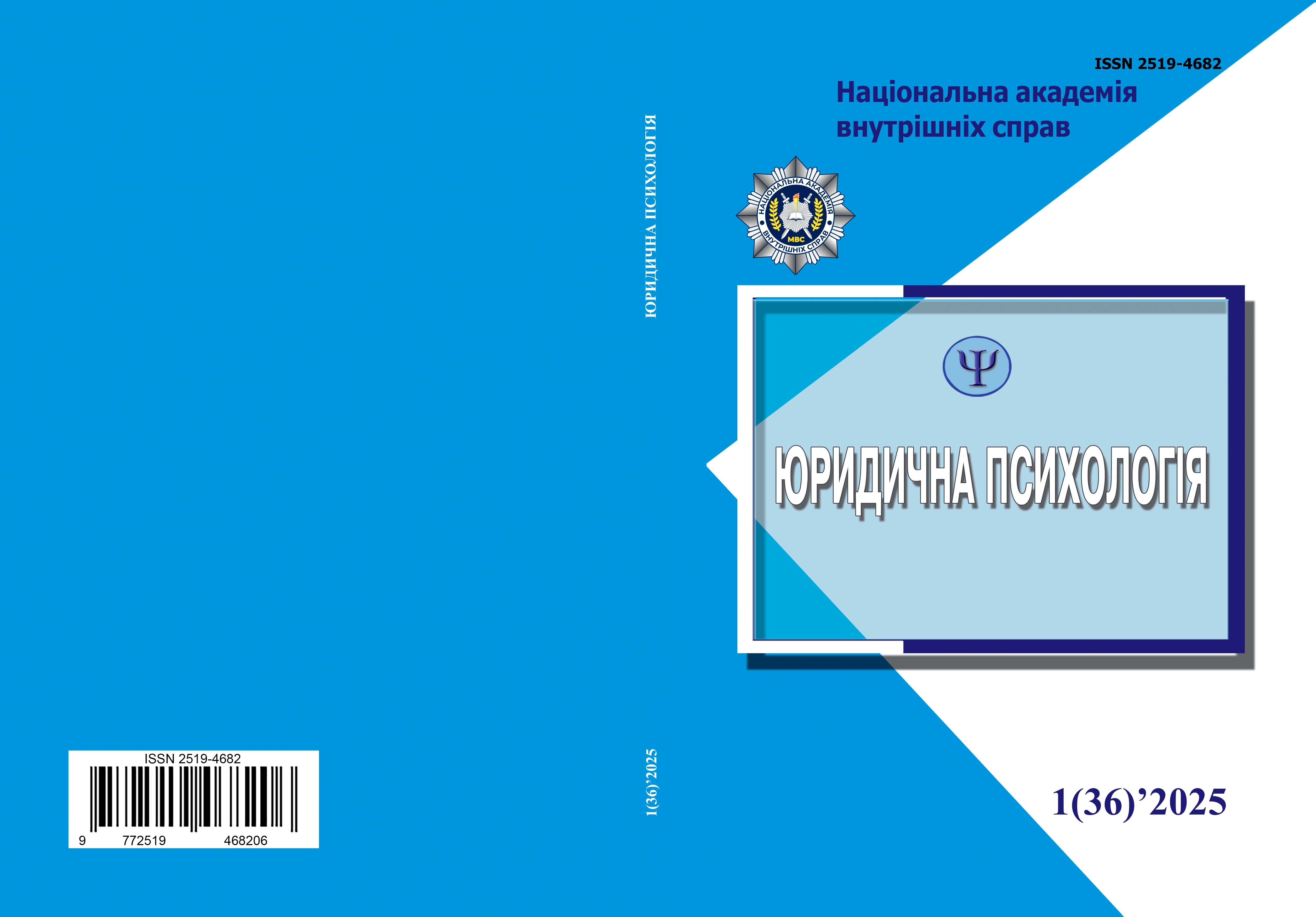Психологія поведінки досліджуваної особи під час проведення поліграфологічного тестування
Анотація
Анотація. Наукова стаття присвячена аналізу актуального питання, пов’язаного із психологією поведінки особи, яка в добровільному порядку дала згоду на проходження психофізіологічного дослідження із застосуванням поліграфа. Увагу зосереджено на особливостях, які виникають чи можуть виникнути під час проведення цієї специфічної процедури дослідження. Мета наукової публікації полягає у висвітленні специфіки психологічної поведінки досліджуваної особи під час проведення поліграфологічного тестування, яка частково є взаємозалежною з поведінкою спеціаліста-поліграфолога. Проаналізовано певні поведінкові моменти, які випливають із правильно організованої комунікативної діяльності фахівця, що проводить це дослідження. Виокремлено прийоми негативної поведінки досліджуваних осіб, спрямовані на отримання для них бажаного результату й відображаються у вигляді таких складових: маніпуляції, жалості, підкупу й шантажу. У межах дослідження використано як загальнонаукові, так і спеціальні методи: порівняльно-психологічний, системно-структурний та метод системного аналізу. Сформовано загальні підходи та висновки в розумінні важливості вивчення психології поведінки досліджуваної особи з метою ефективного проведення поліграфологом дослідження із застосуванням поліграфа.
Ключові слова: психологія поведінки; досліджувана особа; поліграфологічне дослідження; поліграфолог; комунікативне спілкування; психологічні прийоми; специфічна адаптація; неспецифічна адаптація.
Завантаження
Посилання
Adaptation. Site "Wikipedia". Retrieved from https://uk.wikipedia.org/wiki/%D0%90%D0%B4 %D0%B0%D0%BF%D1%82%D0%B0%D1%86%D1%96%D1%8F
Amsel, T. (2020). Centenary project of introspection of 100 years of polygraph practice. European polygraph, 14(1), 23-25. DOI: 10.2478/ep-2020-0003
Berezhnyi, O.I. (2022). Admissibility and evidentiary value of the results of psychophysiological studies using the polygraph. Legal Scientific Electronic Journal, 11, 615-617. DOI: 10.32782/2524-0374/2022-11/149
Boiko-Buzyl, Yu.Yu. (2021). Psychological aspects of lie detection in studies using the polygraph. Psychological Journal, 3(47), 28-37. DOI: 10.31108/1.2021.7.3
Bourke, M.L., Fragomeli, L., Detar, P.J., Sullivan, M.A., Meyle, E., & O'Riordan, M. (2014). The use of tactical polygraph with sex offenders. Journal of Sexual Aggression, 21(3), 354-367. DOI: 10.1080/13552600.2014.886729
Butenko, O.V. (2022). Legal status of the initiator and the person granting permission to conduct a polygraph test. Law Journal of the National Academy of Internal Affairs, 12(2), 16-23. DOI: 10.56215/04221202.16
Dmytrenko, N.A. (2021). The use of the polygraph in criminal proceedings: features and problematic issues. Legal Bulletin, 22, 160-166. DOI: 10.32850/lb2414-4207.2021.22.21
Honts, C.R. (2008). Polygraph and Polygraph Techniques. Encyclopedia of Psychology and Law. DOI: 10.4135/9781412959537.n231
Irkha, Yu., Butenko, O., Pogrebytskyi, M., Manzhai, O., & Krushysnkyi, S. (2021). Problems of Regulatory and Legal Support of Polygraph Application in Ukraine. International Journal of Computer Science and Network Security, 20(11), 203-207. DOI: 10.22937/IJCSNS.2021.21.12.29
Fear. Site "Wikipedia". Retrieved from https://uk.wikipedia.org/wiki/%D0%A1%D1%82%D1% 80%D0%B0%D1%85
Khomenko, M. (2020). The use of polygraph in the detection and investigation of crimes. Entrepreneurship, Economy and Law, 10, 304-308. DOI: 10.32849/2663-5313/2020.10.52
Kolisnichenko, V.V. (2019). Legal support for the use of polygraph in criminal proceedings. Comparative and analytical law, 6, 457-459. DOI: 10.32782/2524-0390/2019.6.115
Kovalchuk, Z. (2022). Socio-Psychological Characteristics of the Suspects Personal Profile during a Polygraphical Examination. Visnyk of V.N. Karazin Kharkiv National University. Series "Psychology", 73, 84-90. DOI: 10.26565/2225-7756-2022-73-10
Krapol, D. (2020). Five milestones in the history of the polygraph. European polygraph, 14(1), 44-46. DOI: 10.2478/ep-2020-0008
Lutsenko, O.E. (2019). Legal regulation of the purpose of conducting a competition for civil service positions with the use of a polygraph. Problems of legality, 145, 140-151. DOI: 10.21564/2414-990x.145.155428
Mokrytska, A., & Slipchenko, T. (2019). Use of the polygraph in law enforcement: experience of foreign countries. Actual problems of law, 1(2), 163-168. DOI: 10.35774/app2019.02.163
Motliakh, O.I. (2012). Polygraph: scientific nature of origin, regulatory and legal regulation and permissible limits of application. Kyiv: Osvita Ukrainy.
Motliakh, O.I. (2022). Polygraphology. Kyiv: Osvita Ukrainy.
Nazarov, O.A. (2023). Legal positions of the Supreme Court on the use of polygraph in criminal proceedings in Ukraine. Forensic psychological examination. Application of polygraph and special knowledge in legal practice, 3(23). DOI: 10.53672/ej.3.2023.01
Okhinchenko, O.S. (2017). Accounting for non-verbal manifestations of a subject's lies during a polygraph interview. Forensic psychological examination. Application of the polygraph and special knowledge in legal practice, 4(17). Retrieved from http://expert-nazarov.com/nomera/844-2017-4-17
Orlova, T.A., Hanzha, T.V., & Volobuiev, I.R. (2024). On the prospects of using the results of research using the polygraph in proving. Analytical and comparative law, 1, 618-622. DOI: 10.24144/2788-6018.2024.01.108
Pazeniuk, Ye. (2024). Psychological aspects of the criteria for the admissibility of tactical techniques. Legal psychology, 1(34), 119-125. DOI: 10.33270/03243401.119
Psychological manipulation. Site "Wikipedia". Retrieved from https://uk.wikipedia.org/ wiki/%D0%9F%D1%81%D0%B8%D1%85%D0%BE%D0%BB%D0%BE%D0%B3%D1%96%D1%87%D0%BD%D0%B0_%D0%BC%D0%B0%D0%BD%D1%96%D0%BF%D1%83%D0%BB%D1%8F%D1%86%D1%96%D1%8F
Rudenko, A.M. (2018). Pre-test interview: principles and techniques. Forensic psychological examination. Application of the polygraph and special knowledge in legal practice, 1(18). Retrieved from http://expert-nazarov.com/nomera/845-2017-5-18
Serdiuk, V.P. (2014). The use of polygraph (lie detector) in criminal proceedings in Ukraine. Information Law, 2(11), 68-71. DOI: 10.37750/2616-6798.2014.2(11).272522
Shapoval, K.A. (2020). The use of the polygraph during the investigation of murders committed with the use of domestic violence. Theory and practice of forensic examination and criminology, 21, 66-78. DOI: 10.32353/khrife.1.2020_04
Shevchenko, S. (2019). Суб’єкти адміністративно-правових відносин психофізіологічних опитувань із використанням поліграфа. Актуальні проблеми правознавства, 3(19), 82-87. DOI: 10.35774/app2019.03.082
Shumilin, S.F., Kupriashyna, Ye.A., Novikova, Ye.A., Potapov, V.Y., & Stepaniuk, A.V. (2018). Limits of using polygraph test results in criminal proceedings. Spiral, 8(4), 3535-3538. DOI: 10.29042/2018-3535-3538
Spruin, E., Wood, J.L., Gannon, T.A., & Tyler, N. (2017). Sexual offende's experiences of polygraph testing: a thematic study in three probation trusts. Journal of Sexual Aggression, 24(1), 12-24. DOI: 10.1080/13552600.2017.1378025
Volobuiev, A.F. (2018). Polygraph: a technical and forensic means of detecting and recording evidence or a tool for expert research? Forensic Bulletin, 30(2), 55-63. DOI: 10.37025/1992- 4437/2018-30-2-55
Переглядів анотації: 108 Завантажень PDF: 108
- Автори залишають за собою право на авторство власної праці та передають журналу право першої публікації цієї роботи на умовах ліцензії Creative Commons Attribution License, яка дає змогу іншим особам вільно розповсюджувати опубліковану працю з обов’язковим посиланням на авторів оригінальної роботи та першу публікацію статті в цьому журналі.
- Автори мають право укладати самостійні додаткові угоди щодо неексклюзивного розповсюдження роботи у тому вигляді, в якому вона була опублікована в журналі (наприклад, розміщувати статтю в репозитарії установи або публікувати у складі монографії), за умови збереження посилання на першу публікацію роботи у цьому журналі.
- Політика журналу дає змогу і заохочує розміщення авторами в Інтернеті (наприклад, у електронних сховищах установ або на особистих веб-сайтах) рукопису статті як до подання цього рукопису до редакції, так і під час його редакційного опрацювання, оскільки це сприяє продуктивній науковій дискусії та позитивно впливає на оперативність та динаміку цитування опублікованої роботи.




